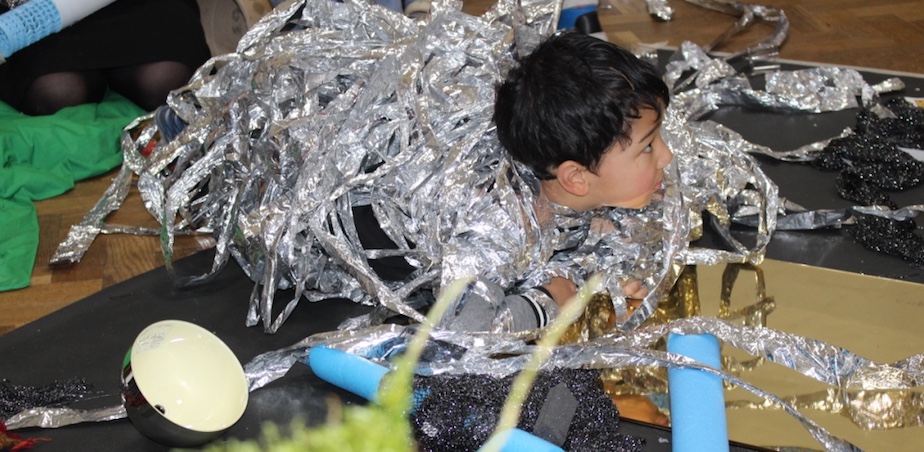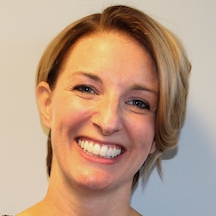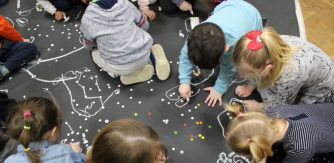Blog 3 – Milica Atanackovic, Training & Practice Manager Early Childhood Ireland

Creativity through materials, space and time

Milica (Mili) Atanackovic is a Practice and Training Manager with Early Childhood Ireland. Her background in the early years is rooted within a passionate interest in Creative Arts. Mili originally studied Design Communication before moving into Early Childhood Care and Education in Australia. Considering training and mentoring as a key element of quality in the early years, Mili has worked as an Educator, Service Manager and Trainer, she also combines experience from a range of creative disciplines to her work
Creativity through materials, space and time
‘There is no substitute for exploration, unconstrained by rules or expectations when it comes to generating creative solutions to our problems.’ Alison Gopnik
More and more research hints at simple, open-ended objects as ones that are most likely to be used continuously, over and over to stimulate the imagination of children regardless of their age. These are objects such as cups, tubes, fabric, natural elements including bark, sticks, stones, feathers. These are materials that can be used in multiple ways, and are activated and defined by the child’s exploration. Three settings – Creative Kids Walkinstown, Corduff Childcare and YMCA Childcare Kidsworld Creche – were selected to participate in a sensory project with ReCreate* and Early Childhood Ireland, and use open-ended materials within their existing environments. The project was based on the strategic approach of ReCreate and Early Childhood Ireland to support the arts in early childhood education, and focused on the marriage of the arts and pedagogy – the arts as a language of inquiry, a way of communicating, exploring and thinking (Aistear 2009) in early childhood.
The sensory project took reusable open-ended materials from ReCreate to engage children’s senses through play. The artist Deirdre Rogers from ReCreate set up each room with objects intended to spark curiosity, imagination and exploration. The focus was the process of exploration – allowing children to be with the materials, to create without seeking a result. It positioned the environment as the ‘third teacher’ – an ECE environment can bring hope and inspiration to the child and educator, or it can be lack lustre and leave them frustrated. Seeing the environment as a teacher reminds us that our spaces should provoke learning and stretch the mind.
Children need to be given the opportunity to realise their potential as thinkers and creators. Open-ended materials and unstructured play encourage them to devise their own challenges, problem-solve and be immersed in their thoughts. Children in the throngs of self-directed creative play are too often interrupted. Creativity is nurtured when adults master the skill of quiet observation, answering questions from children when requested to. In the sensory project, educators were positioned as observers and co-explorers, not instructors, to support each child’s creative spirit.
One goal was for children to use the materials to develop their own problem-solving abilities through trial and error. Through observation, the educators made additional sensory provocations available and incorporated these into the spaces as extensions of the children’s exploratory processes. Photography was used to document the processes children engaged in. Photographs help boost children’s memories by revisiting their experiences and reminding them of the process. During the project, the children were confident, resembling scientists in the depths of problem solving and questioning. As Alison Gopnik has discovered, children are like ‘scientists testing theories’, expressing their intelligence through connections with the every day, with people and objects. Explicit teaching can interfere with what comes innately to young children.
By giving the children more time to exhibit their independence and engage with each provocation, and have a say in what was going on around them, they started to develop the sense that their own ideas and opinions matter. The children moved bubble wrap through the space, popping it using their hands and feet, the technique of jumping was applied and the couch was used as a prop to bring more height to the experience. They explored, for example, light and shadow using projectors, tasted the bitterness of lemons, constructed and deconstructed a wide variety of objects. The camaraderie oozed from each small group as experiences strengthened their play communities. Masterful negotiations were witnessed as the children’s play was extended.
We sometimes unintentionally limit children’s ideas and creativity by assuming they are aiming for a specific outcome or result. Our role is to offer encouragement, rather than instructions. The child’s sense of agency was encouraged by welcoming and responding thoughtfully and respectfully to their questions and ideas. One of the best aspects of inquiry-based approaches is that they often lead to unexpected surprises and extended ongoing investigations. One goal of the project was to support educators in using open-ended materials in their environments, to develop sensory spaces that extend beyond one-off activities. However, the overarching goal was to ensure each child is given the space to engage uninterrupted and unquestioned, tuned in to each precious moment in time.
*ReCreate: recreate.ie/Recreate is a thriving social enterprise making art materials and educational supplies affordable and accessible to every sector of the community.
